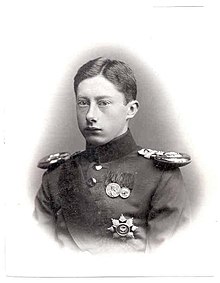Bernhard Heinrich of Saxe-Weimar-Eisenach
Bernhard Carl Alexander Hermann Heinrich Wilhelm Oscar Friedrich Franz Peter of Saxe-Weimar-Eisenach (born April 18, 1878 in Weimar ; † October 1, 1900 in Eisenach ) was Prince of Saxe-Weimar-Eisenach and Duke of Saxony.
Life
Bernhard Heinrich was the son of Hereditary Grand Duke Karl August of Saxe-Weimar-Eisenach (1844-1894) from his marriage to Pauline (1852-1904), daughter of Prince Hermann of Saxe-Weimar-Eisenach (1825-1901). He was the younger brother of Grand Duke Wilhelm Ernst (Sachsen-Weimar-Eisenach) . His grandparents were Grand Duke Carl Alexander (Saxe-Weimar-Eisenach) (1818–1901) and Princess Sophie of the Netherlands (1824–1897). His carefree nature obviously made the next-born everyone's favorite. He was "very delicate and small, but in sporting matters quite energetic, very funny and of a friendliness towards everyone, which earned him quite a popularity".
From 1890, Bernhard Heinrich and his brother Wilhelm Ernst attended the Wilhelm-Gymnasium in Kassel , where the future Kaiser Wilhelm II had also been taught. Prince Bernhard Heinrich was registered with the 3rd Guard Uhlans in Potsdam - the regiment in which Harry Graf Kessler (1868–1937) had also done his one-year volunteer military service in 1892/1893.
Prince Bernhard Heinrich inherited the property around Racot Castle and the Stenschewo rule in Posen . Together with his brother, in addition to the inheritance entitlement to the Dutch throne, he had also inherited possessions in the Netherlands from his grandmother, the Dutch Princess Sophie.
death
He died on October 1, 1900. “Prince Bernhard Heinrich had come to the Wartburg with a bad cold from the maneuvers and did not spare himself there while taking part in the hunts, but, as I am told, his condition seemed to be quite harmless even on Sunday evening. when he went to bed with a fever. On Monday morning the prince felt weak as a result of a high fever, but took tea for breakfast and spoke jokingly to the doctor. The latter suddenly noticed that death was coming, and His Royal Highness had the Grand Duke fetched, who came just in time to hold the cold hand of his gently slumbering grandson in his. The Hereditary Grand Duke stayed in Silesia . According to the doctor, the death occurred as a result of rapid pneumonia. "
ancestors
| Pedigree of Bernhard Heinrich of Saxe-Weimar-Eisenach | ||||||||
|---|---|---|---|---|---|---|---|---|
| Great grandparents |
Grand Duke |
King |
Prince Karl Bernhard of Saxe-Weimar-Eisenach (1792–1862) ⚭ 1816 |
King Wilhelm I (Württemberg) (1781–1864) |
||||
| Grandparents |
Grand Duke Carl Alexander (Saxe-Weimar-Eisenach) (1818–1901) |
Prince Hermann of Saxe-Weimar-Eisenach (1825–1901) |
||||||
| parents |
Hereditary Grand Duke Karl August of Saxe-Weimar-Eisenach (1844–1894) |
|||||||
|
Prince Bernhard Heinrich of Saxe-Weimar-Eisenach (1878–1900) |
||||||||
literature
- Bernhard Post ; Dietrich Werner: Ruler at the turn of the century: Wilhelm Ernst von Sachsen-Weimar-Eisenach, 1876–1923. Glaux, Jena 2006, ISBN 978-3-931743-94-9 .
- Hellmut Seemann : Europe in Weimar: Visions of a continent. Wallstein Verlag, 2008, ISBN 978-3-8353-0281-5 .
- Klaus Günzel: The Weimar Princely House. A dynasty makes cultural history. Böhlau Verlag, Cologne-Weimar-Wien 2001, ISBN 3-412-03100-3 , p. 177.
Web links
Individual evidence
- ^ Bernhard Post; Dietrich Werner: Ruler at the turn of the century: Wilhelm Ernst von Sachsen-Weimar-Eisenach, 1876–1923. Glaux, Jena 2006, p. 39.
- ^ Bernhard Post; Dietrich Werner: Ruler at the turn of the century: Wilhelm Ernst von Sachsen-Weimar-Eisenach, 1876–1923. P. 42.
- ^ Bernhard Post; Dietrich Werner: Ruler at the turn of the century: Wilhelm Ernst von Sachsen-Weimar-Eisenach, 1876–1923. P. 49.
- ^ Hellmut Seemann: Europe in Weimar. Visions of a continent. P. 346.
- ^ Bernhard Post; Dietrich Werner: Ruler at the turn of the century: Wilhelm Ernst von Sachsen-Weimar-Eisenach, 1876–1923. P. 60.
| personal data | |
|---|---|
| SURNAME | Bernhard Heinrich of Saxe-Weimar-Eisenach |
| ALTERNATIVE NAMES | Bernhard Heinrich Prince of Saxe-Weimar-Eisenach |
| BRIEF DESCRIPTION | Prince of Saxe-Weimar-Eisenach |
| DATE OF BIRTH | April 18, 1878 |
| PLACE OF BIRTH | Weimar |
| DATE OF DEATH | October 1, 1900 |
| Place of death | Eisenach |
